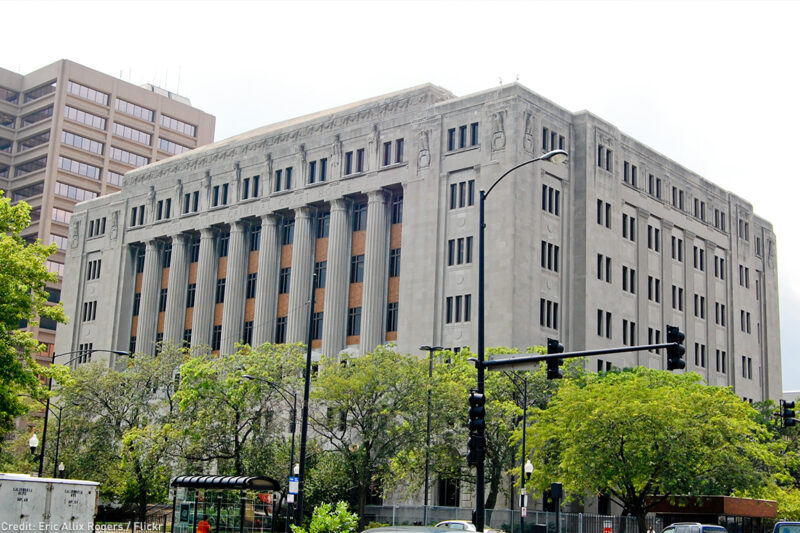
In Illinois, you’ll often hear police officials say that the only way to fight back against the Scarfaces of the world is to make sure crime doesn’t pay. The primary tool police use to do that is through civil asset forfeiture laws, which allow law enforcement to confiscate people’s private property based on the mere suspicion that the property was involved in criminal activity. The property can be taken by police regardless of whether the property owner is convicted of a crime or, get this, even charged with a crime for that matter.
This powerful tool was supposed to be reserved for disrupting large-scale criminal syndicates, but spending just a few hours in courtroom 1707 of the Richard Daley building in downtown Chicago reveals how civil asset forfeiture laws have mutated into something sinister. Drug cartels and other large criminal organizations are seldom affected by these laws. Instead, the laws burden low-income people and communities of color with the weight of an unfair and misdirected criminal justice system that violates their due process rights.
Each day, room 1707 fills with people who have had their property seized by the police. They are there because they want it back. Absurdly, these forfeiture actions were filed not against them personally but against the property itself. But to reclaim the property, the owners bear the burden of proving their innocence, turning the principle of “innocent until proven guilty” on its head. The majority of the people in the courtroom are Black or Latino. And very few are represented by an attorney because, unlike in the criminal justice system, an attorney isn’t provided in civil court.
Contrary to the preferred narrative of law enforcement, these cases rarely involve trunks full of plastic-wrapped $100 bills, Maseratis, yachts, or other luxury items associated with major criminal enterprises. Instead the property at issue is often just a few hundred dollars cash or a rickety old car. The alleged crimes for which property is seized usually involve small amounts of marijuana or controlled substances. Only a minority of cases involve large quantities of drugs indicative of trafficking.
A new survey of public records over the past five years confirms that property seizures in Cook County are concentrated in the poorest parts of Chicago. The data — collated by Lucy Parsons Labs, a police accountability nonprofit — includes both the locations of seizures and a description of the property seized. The 23,000-plus seizures reported from 2012 through 2017 were plotted on a map published in Reason magazine, showing that a disproportionate number of seizures occur in the city’s lowest-income communities, the majority Black neighborhoods on the South and West sides.
Reason’s analysis of the data shows the average value of property seized was relatively low. Approximately 11,000 seizures over five years involved amounts of currency less than $1,000, and nearly 1,500 involved amounts under $100. Not surprisingly, the lower the property’s value, the more likely it was to have been seized from a person in a community of color.
The dirty little secret of civil asset forfeiture is that police often get to keep a sizable amount of the cash and property they seize. Since property owners’ due process rights are essentially null and void, police know that what they seize they’ll likely keep. Last November, the ACLU and the Illinois Policy Institute released a report on civil asset forfeiture. We found that between 2005 and 2015 Illinois law enforcement took in more than $319 million through forfeiture.
The results of these studies come at an opportune time for Chicago and the state of Illinois. A strong reform bill passed in the legislature recently with overwhelming bipartisan majorities. It awaits the governor’s signature.
The reform legislation, a product of compromise between reform advocates and the law enforcement lobby, ensures that the burden of proving the property owner’s culpability in a forfeiture case rests squarely with the government and raises the standard of proof from probable cause to a preponderance of the evidence for the government to prevail at trial. The bill exempts small sums of cash from forfeiture and provides that possession of a miniscule amount of drugs alone shall not authorize forfeiture of personal property.
The reform legislation also eliminates the current requirement that property owners must pay 10 percent of the value of their property upfront in order to contest seizures, and it creates an expedited procedure will allow innocent owners to have their claims adjudicated more rapidly. These reforms will reduce the financial barriers and long delays that too often deter people from pursuing the return of their property.
Additionally, the legislation requires public reporting of seizure and forfeiture data, which will enable taxpayers and lawmakers to find out how much property is being seized by law enforcement agencies around the state, the types of property forfeited, the amount of forfeiture proceeds received by law enforcement agencies, and how they spend the money.
While some states have gone even further, requiring a criminal conviction before property can be forfeited, these are all important changes to protect the rights and property of the people of Illinois.
The time is now to pass this legislation. Urge Gov. Bruce Rauner to sign the bill without delay.





